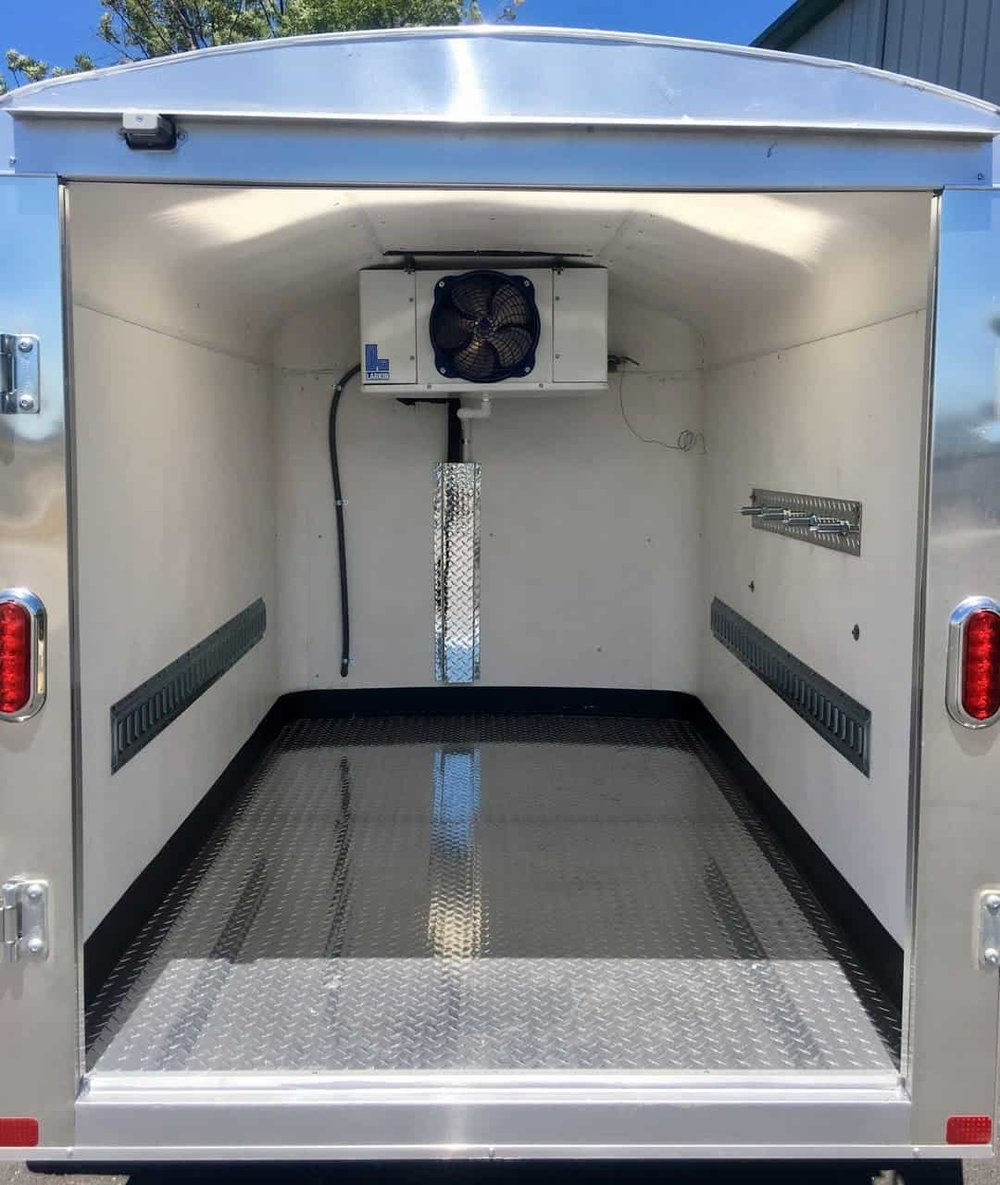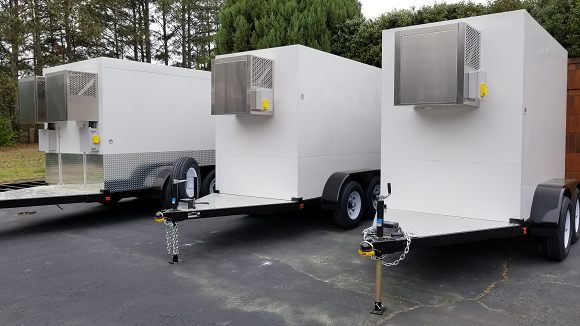Your Guide to Small Refrigerated Trailer-Cooler Trailers: Keep Points Cool
Your Guide to Small Refrigerated Trailer-Cooler Trailers: Keep Points Cool
Blog Article
The Ultimate Guide to Choosing the most effective Cooled Trailers
When it comes to selecting the excellent cooled trailer for your organization requirements, different aspects should be meticulously considered to make certain optimal efficiency and performance. From the different kinds of chilled trailers available to the crucial features such as size, temperature level control, and power efficiency, each element plays an important role in figuring out the best fit for your details requirements.
Types of Refrigerated Trailers

The 2 main types of refrigerated trailers are reefer trailers and insulated trailers. Reefer trailers, short for chilled trailers, are outfitted with cooling down systems that proactively control the interior temperature to maintain subject to spoiling items at the necessary conditions during transport.

Size Factors To Consider
Thinking about the dimensions of the chilled trailer is crucial to make sure ideal storage ability and effective transport of disposable goods. When picking the dimension of a refrigerated trailer, it is critical to take right into account the volume of items that need to be transported. Bigger trailers provide even more storage area, making them ideal for services with substantial delivery needs. Smaller sized trailers are much more cost-efficient and maneuverable for organizations with lesser tons or minimal storage space at their centers.
An additional factor to think about when establishing the dimension of the refrigerated trailer is the dimensions of the products being transferred. Some items might have details dimension needs or require to be piled in a certain fashion to stop damage. Selecting a trailer dimension that fits the dimensions of the goods will aid keep their top quality throughout transportation.

Temperature Control Features
Reliable administration of temperature control in refrigerated trailers is critical for maintaining the high quality and safety of perishable items during transportation. When picking a chilled trailer, it is vital to think about the temperature control features it offers. Seek trailers outfitted with sophisticated temperature level tracking systems that provide real-time information on the indoor conditions. These systems should have specific temperature settings and signals for any type of deviations, making certain that the freight remains within the needed temperature array.
Additionally, some refrigerated trailers include multi-zone temperature level control capabilities, enabling various areas to maintain varying temperature levels as required for different kinds of items. This attribute is particularly helpful when transferring a mix of disposable things with distinctive temperature demands. small refrigerated trailer- cooler trailers. Furthermore, trailers with effective insulation and temperature level harmony throughout the freight room aid prevent chilly or warm areas, making certain regular problems for all items being delivered
Energy Performance Variables
A necessary element to evaluate when selecting a cooled trailer is its energy efficiency, which plays a considerable duty in lowering operational expenses and ecological effect. Energy effectiveness aspects to take into consideration consist of the insulation high quality of the trailer, the type of refrigeration system used, and any additional attributes that contribute to reducing power usage. Top notch insulation is vital as it assists maintain the desired temperature level inside the trailer with very little energy loss. Modern refrigeration systems, such as those utilizing innovative innovation like electric standby alternatives or solar energy, can likewise enhance power effectiveness. Additionally, attributes like automatic defrost cycles, temperature level surveillance systems, and effective air movement style can even more maximize power usage. By focusing on energy-efficient refrigerated trailers, organizations can not just save on overhead however also minimize their carbon footprint, making a favorable contribution to sustainability initiatives in the transportation sector.
Maintenance and Solution Tips
Offered the crucial function of power efficiency in minimizing functional prices, it is crucial to develop a proactive maintenance and solution regimen for chilled trailers to guarantee ideal efficiency and longevity. Frequently evaluating and keeping the trailer's refrigeration system is vital. This consists of examining the gaskets for any kind of wear and tear, guaranteeing appropriate insulation, and cleaning up the condenser and evaporator coils. Monitoring temperature levels and calibrating the thermostat periodically can help avoid temperature my review here fluctuations that may jeopardize the high quality of the carried products. Furthermore, checking the trailer's tires, brakes, lights, and electrical systems is important to assure reliable and secure procedure. Teaming up with a reputable company for regular maintenance checks and dealing with any issues promptly can significantly expand the life-span of the cooled trailer. Carrying out go to this web-site an in-depth maintenance schedule and maintaining complete records of all service and fixings carried out can help in identifying fads, enhancing performance, and decreasing unanticipated malfunctions.

Final Thought
To conclude, choosing the very best cooled trailer involves taking into consideration various variables such as the kind of trailer, dimension requirements, temperature control features, energy effectiveness, and upkeep needs. By reviewing these aspects very carefully, click businesses can guarantee they pick a cooled trailer that fulfills their specific requirements and needs, eventually resulting in extra efficient transportation and storage space of temperature-sensitive goods.
The two main kinds of refrigerated trailers are reefer trailers and insulated trailers (small refrigerated trailer- cooler trailers). Reefer trailers, brief for chilled trailers, are equipped with cooling systems that actively control the inner temperature to keep subject to spoiling items at the required conditions during transportation.On the various other hand, shielded trailers are made to maintain the temperature of the goods utilizing the insulation buildings of the trailer wall surfaces. While they do not have active cooling systems like reefer trailers, protected trailers are ideal for items that require defense from exterior temperature level variants yet do not call for as rigorous temperature level control as subject to spoiling items.Reliable monitoring of temperature level control in chilled trailers is essential for preserving the quality and safety of perishable goods during transport
Report this page